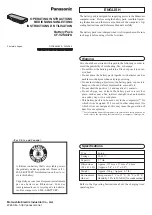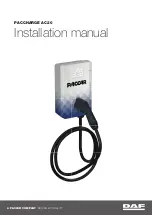
TXS 2229 Charge sensor
Electronic device with 433.92 Mhz transmitter and Current
sensor of the charge applied to the integrated 230Vac socket.
T
ECHNICAL
D
ATA
- Power supply:
230V~ 50/60Hz 510W max.
- User output:
230V~ 100-500W Max.
- Working temperature:
-10
55°C
- Radio transmitter: 433.92 MHz
- Transmitter type coding:
18 bit Random Code
- Dimensions: 100 x 55 x 90 mm.
- Container: ABS UL94V-0 (IP40)
D
EVICE
I
NSTALLATION
For excellent functioning, it is very important to choose the
place of installation carefully. Capacity is not only conditioned
by the technical features of the device, but also varies depend-
ing on the radio-electric conditions of the site.
The transmitter has an incorporated antenna.
I
NITIAL
F
UNCTIONING
C
ONDITION
The device can only work coupled with one or more control
units, upon first ignition the device contains a property code in
the memory that cannot be amended, of Rolling code type.
F
UNCTIONING
M
ODE
The device constantly controls the charge applied to the 230V
current socket. According to the variation of the applied load
absorptions, two distinct transmission codes will be sent at
433.92 Mhz (Descent code if the charge is at maximum, Ascent
code if the charge is in Stand-By or disconnected).
The device is ready for functioning with pre-defined charge set-
tings. In case of anomalous functioning compared to wanted
ones, it will be necessary to program the device.
P
ROGRAMMING
M
ETHOD
OF
THE
D
EVICE
The programming of the device current threshold is the Self-
learning type and is performed in the following way: connect the
charge to be checked
and bring it in the condition of maximum current absorption,
press the SEL key, three sounds will be heard confirming pro-
gramming entry. After approx. 3 seconds, the device will emit a
confirmation sound to signal the occurred programming of the
new current threshold, subsequently four confirmation sounds
will be heard to signal the end of the programming mode.
Whereas if, after having pressed the SEL key the device cannot
memorise any current threshold within 15 seconds the device
will emit four confirmation sounds, signalling the end of the pro-
gramming phase.
It is possible to repeat the above described programming oper-
ation for the acquisition of new parameters of the applied
charge.
M
ANUAL
T
RANSMISSION
M
ETHOD
OF
THE
D
EVICE
The transmission of the device can be forced, for example, to
facilitate programming on the control unit to be coupled as fol-
lows: connect the device to the electric network keeping the
SEL key constantly pressed for 5 seconds, six sounds will be
heard confirming the sending of only the Descent code of the
device at 433.92 Mhz.
It is possible to repeat the above described transmission opera-
tion for a new sending of the transmission code.
S
OUND
S
IGNALS
1 BIP =
Memorised current threshold.
3 BIP =
Programming phase start
4 BIP =
Programming phase end
5 BIP =
Deletion of memorised current threshold.
6 BIP =
Sending of transmission code
R
ESET
Should it be necessary to restore the control unit to default set-
ting (without memorised current threshold), press the SEL key
continuously for 5 seconds, the control unit will emit five con-
firmation sounds and the operation will be complete.
I
MPORTANT
FOR
THE
INSTALLER
1
Rev. 1.1 06/09/11
GB




















